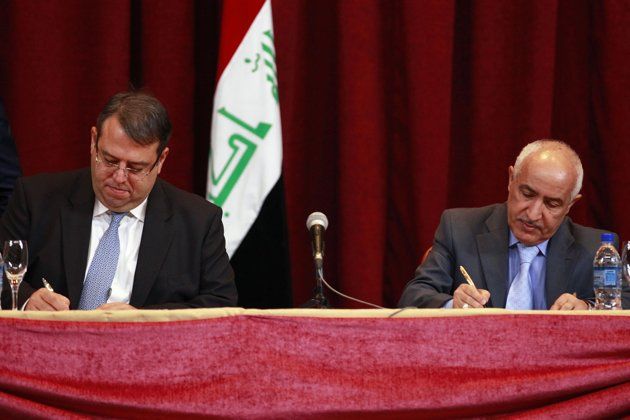 Gati Al-Jebouri, left, Executive Director of LITASCO LUKOIL global trader and Dhiya Jaafar, chief of Iraq's South Oil Company sign a contract in Baghdad, Iraq, Wednesday, Nov. 7, 2012 U.S. oil giant Exxon Mobil Corp. has expressed an interest in pulling out of a major oil field development project in the country's south, a senior Iraqi oil ministry official said Wednesday.
Gati Al-Jebouri, left, Executive Director of LITASCO LUKOIL global trader and Dhiya Jaafar, chief of Iraq's South Oil Company sign a contract in Baghdad, Iraq, Wednesday, Nov. 7, 2012 U.S. oil giant Exxon Mobil Corp. has expressed an interest in pulling out of a major oil field development project in the country's south, a senior Iraqi oil ministry official said Wednesday.
The comments by the ministry's licensing and contracts chief, Abdul-Mahdi al-Ameedi, were the first official acknowledgement of reports that Exxon wants to exit the 8.6 billion barrel West Qurna Phase 1 project.
"There is talk about this issue. In fact, Exxon Mobil is interested in selling its whole share or part of it to other companies and leave West Qurna," al-Ameedi told reporters at an event in the Iraqi capital.
Irving, Texas-based Exxon Mobil is the main developer of the West Qurna-1 project. It was awarded rights to work on the field in 2009 along with minority partner Royal Dutch Shell PLC.
Exxon had no comment about the possibility that it might leave the project — a position it has maintained for weeks despite reports that have resonated in the markets.
The energy company irked Iraq's central government when it signed up to hunt for oil in the country's self-ruled Kurdish region late last year.
Al-Ameedi also said that Baghdad has decided to exclude Turkish company TPAO from a consortium that won a separate deal to hunt for oil in Iraq's south earlier this year. TPAO was a minority partner in a consortium led by Kuwait Energy that won rights in May to explore 900-square-kilometer (350-square-mile) Block 9 in the southern province of Basra.
Its exclusion means that Kuwait Energy will now control 70 percent of the project. Remaining minority partner Dragon Oil of the United Arab Emirates will hold a 30 percent stake.
Al-Ameedi made the remarks during a signing ceremony for a deal between Iraq and a consortium led by Russia's private oil giant Lukoil to explore for oil in the 5,500-square-kilometer (2,123-square-mile) block 10, which stretches through the southern provinces of Muthana and Thi Qar. The Russian company and its partner, Japan's Inpex, will be paid $5.99 for each barrel of oil equivalent.
Iraq seeks foreign investment to develop vast natural resources after decades of war, U.N. sanctions and neglect.
 В Атырау -10
В Атырау -10